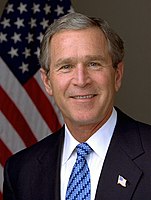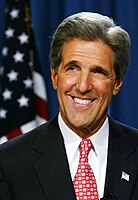| |||||||||||||||||||||||||||||
538 members of the Electoral College 270 electoral votes needed to win | |||||||||||||||||||||||||||||
|---|---|---|---|---|---|---|---|---|---|---|---|---|---|---|---|---|---|---|---|---|---|---|---|---|---|---|---|---|---|
| Opinion polls | |||||||||||||||||||||||||||||
| Turnout | 60.1%[1] | ||||||||||||||||||||||||||||
| |||||||||||||||||||||||||||||
 Presidential election results map. Red denotes states won by Bush/Cheney and blue denotes those won by Kerry/Edwards. Light blue is the electoral vote for John Edwards by a Minnesota faithless elector. Numbers indicate electoral votes cast by each state and the District of Columbia. | |||||||||||||||||||||||||||||
| |||||||||||||||||||||||||||||
The 2004 United States presidential election was the 55th quadrennial presidential election, held on Tuesday, November 2, 2004. The Republican ticket of incumbent President George W. Bush and his running mate incumbent Vice President Dick Cheney was re-elected to a second and final term. They narrowly defeated the Democratic ticket of John Kerry, a senator from Massachusetts, and his running mate John Edwards, a senator from North Carolina.
Bush and Cheney were renominated by their party with no difficulty. Former Vermont governor Howard Dean emerged as the early front-runner in the 2004 Democratic Party presidential primaries, but Kerry won the first set of primaries in January, and then clinched his party's nomination in March after a series of primary victories. Kerry chose Edwards, who was the runner-up in the primaries, to be his running mate. Foreign policy was the dominant theme throughout the election campaign, particularly Bush's handling of the war on terror and the 2003 invasion of Iraq. Bush presented himself as a decisive leader and attacked Kerry as a "flip-flopper". Kerry criticized Bush's conduct of the Iraq War, despite having voted for it himself. Domestic issues were debated as well, including the economy and jobs, health care, abortion, same-sex marriage, and embryonic stem cell research.
Bush won by a narrow margin of 35 electoral votes and took 50.7% of the popular vote. Bush swept the South and the mountain states and took the crucial swing states of Ohio, Iowa, and New Mexico, the last two flipping Republican. Although Kerry flipped New Hampshire, Bush won both more electoral votes and states than in 2000. Ohio was the tipping-point state, and was considered to be the state that allowed Bush to win reelection. Some aspects of the election process were subject to controversy, although not to the degree seen in the 2000 presidential election. Bush won Florida by a five-percent margin, a significant improvement over his razor-thin victory margin in the state four years earlier which led to a legal challenge in Bush v. Gore. This was the first presidential election since 1988 where the Republican nominee won the popular vote. As of 2024, this was the most recent presidential election in which the winning candidate won fewer than 300 electoral votes. It is also the most recent in which the Republican candidate won Colorado, New Mexico, or Virginia.
This remains the most recent presidential election in which both major party candidates flipped at least one state and the only presidential election since 1984 in which the incumbent Republican president won a second consecutive term. At the time, Bush also received the most popular votes in history, a record which would be broken in the 2008 presidential election. Bush also became the only incumbent president to win reelection after previously losing the popular vote. This is also the last time that a male Democratic presidential candidate lost an election, as well as the only election between 1992 and 2020 where a Republican won the national popular vote. In addition, this was also the most recent presidential election where a candidate from either party would win fewer than 20 states, until the Democratic candidate Kamala Harris (like John Kerry) was held to winning only 19 in 2024. This was also the last presidential election in which the winning ticket did not have either Joe Biden or Donald Trump on it.
- ^ "National General Election VEP Turnout Rates, 1789-Present". United States Election Project. CQ Press. Archived from the original on July 25, 2014. Retrieved February 21, 2023.
Cite error: There are <ref group=lower-alpha> tags or {{efn}} templates on this page, but the references will not show without a {{reflist|group=lower-alpha}} template or {{notelist}} template (see the help page).

